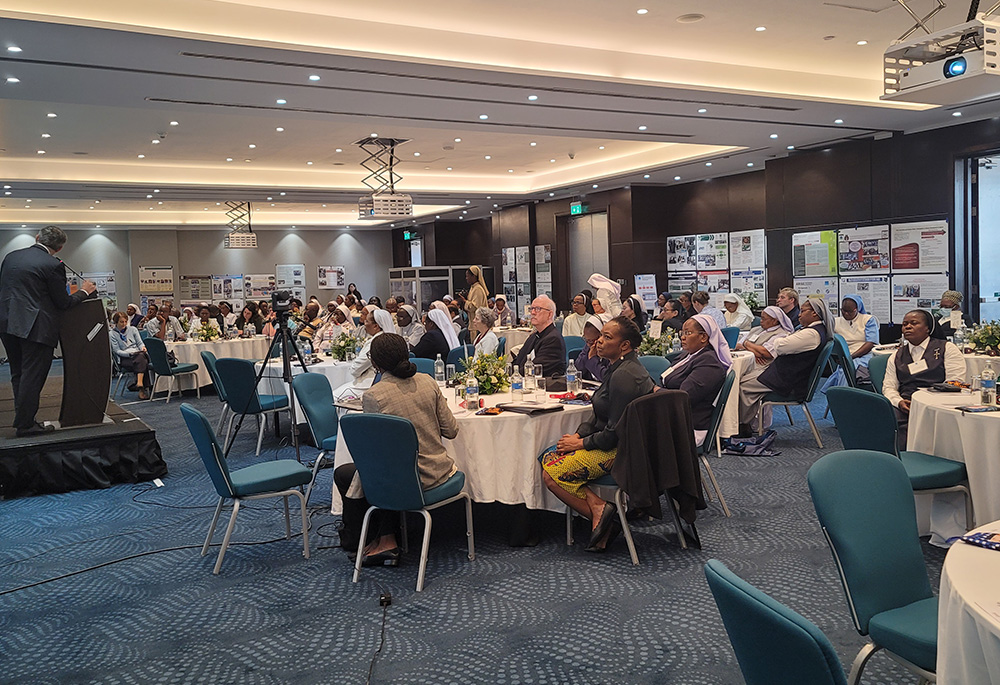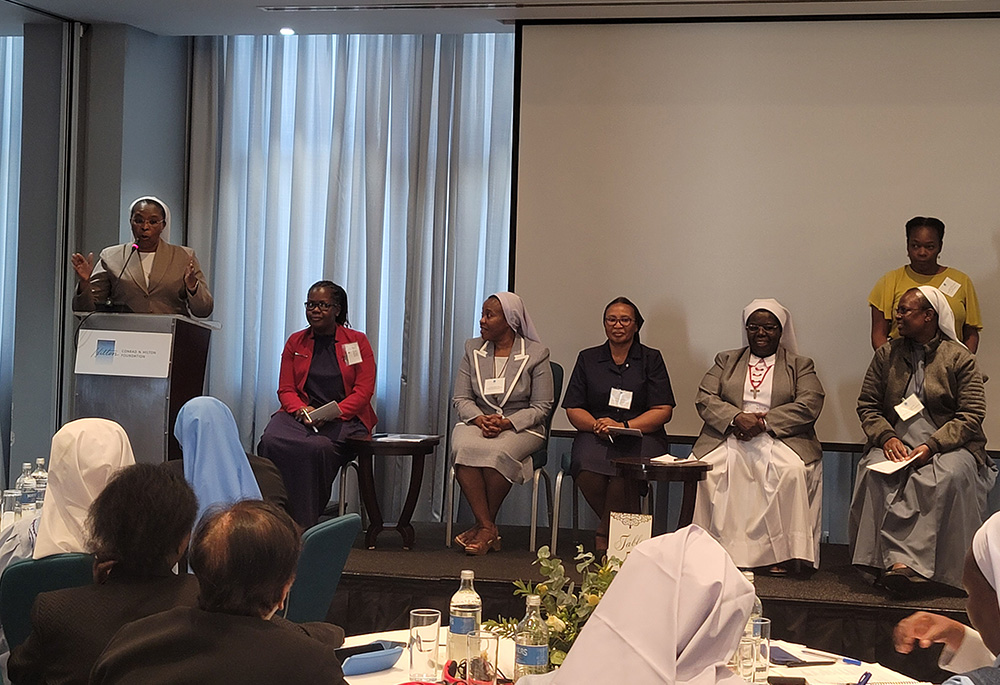
Participants in the Conrad N. Hilton Foundation global convening gather Oct. 27 in small groups for a brainstorming exercise on the importance of gathering, analyzing and using data. (GSR photo/Gail DeGeorge)
Editor's note: The Conrad N. Hilton Foundation is the primary funder of Global Sisters Report.
The Oct. 26-28 Conrad N. Hilton Foundation global convening was an affirmation of achievements and a challenge, complete with instructive sessions, on how to continue to develop and reach goals for the more than 110 participants, mostly Catholic sisters, from 16 countries.
Sessions at the gathering in Nairobi, Kenya, included the importance of gathering, analyzing and using data in decision-making; a panel discussion of sisters involved in on-the-ground ministries; and the power of networks. There was a session devoted to the safeguarding of children and vulnerable adults, another about elder care, one about connecting the "global sisterhood," and one about how equity and inclusion is grounded in Catholic social teaching and fundamental to sisters' programs and ministries.
At the opening of the gathering, Sr. Jane Wakahiu, a Little Sister of St. Francis of Kenya, associate vice president of program operations at the Hilton Foundation and head of the Catholic Sisters Initiative, reviewed and reaffirmed the initiative's vision and Strategy 25 goals, which have specific benchmarks to educate sisters, strengthen their effectiveness, make congregations more self-sustaining, and lift the profile of sisters at the Vatican and in policy-making bodies in areas in which sisters have expertise, such as education and anti-human-trafficking efforts.
The foundation and its Hilton Fund for Sisters, which provides small, project-specific grants to Catholic sisters, are building the field of Catholic sisters in large part through networking, connecting sisters with each other and amplifying their voices.
"It is a whole new way of working," Wakahiu said. "We are moving toward partnerships in terms of the work, the ministries, in terms of supporting youth and families. When we talk about advocacy, it's to raise the profile of sisters on particular issues."
On a panel about integral human development, participants heard from four sisters involved in successful programs.

Sr. Jane Wakahiu, head of the Conrad N. Hilton Foundation's Catholic Sisters Initiative, left, introduces an Oct. 27 panel on advocacy and human development, which featured, from second from left: Jacqueline Chebi, senior project officer for Catholic Relief Services and moderator of the panel; Sr. Eucharia Madueke, project coordinator for women's empowerment programs at the Africa Faith and Justice Network; Sr. Olivia Umoh, coordinator of Safe-Child Advocacy in the Archdiocese of Kumasi, Ghana; Sr. Rosemary Nyirumbe, who began the St. Monica's Vocational School for Girls in Gulu, Uganda; and Sr. Agnes Lando of the Network of Catholic Sister Communicators. (GSR photo/Gail DeGeorge)
Sr. Eucharia Madueke, a Sister of Notre Dame de Namur and project coordinator for women's empowerment programs at the Africa Faith and Justice Network, spoke about anti-trafficking efforts in Edo state, Nigeria, and getting the government to pass laws against trafficking.
Edo is the only state with an anti-trafficking law in the country and includes protection against domestic trafficking, which often involves children, she said. The sisters met with traditional rulers and asked them to protect their people against trafficking.
In addition to protecting victims, Madueke said it was rewarding "just to see the joy that sisters have when come to us" to help effect change on a broader level.
Sr. Olivia Umoh, a Daughter of Charity of St. Vincent de Paul and coordinator of Safe-Child Advocacy in the Archdiocese of Kumasi, Ghana, spoke about sisters networking and working with government officials to address the issues of street children. Sacred Heart of Jesus Sr. Rosemary Nyirumbe, director of the St. Monica's Vocational School for Girls in Gulu, Uganda, described how the program, initially started for and still focused on retraining girls forced into being child soldiers by rebel groups, has evolved to also serve women, particularly mothers, who are incarcerated. Sr. Agnes Lando of the Sisters of Mary of Kakamega related how the newly formed Network of Catholic Sister Communicators is lifting the profiles of sisters in Africa through publications, videos and interviews.
The importance of the role of sisters in advocacy — and in collecting and analyzing data on the programs they run and the people they serve — was an underlying theme throughout the convening.
Advertisement
"We are an army that can be intentional to really make a difference in our countries," Wakahiu told participants.
In a session about the power of networks, Sr. Gabriella Bottani, a Comboni Missionary Sister who recently stepped down as director of Talitha Kum, the network of Catholic sisters working against human trafficking, told of the organization's growth. Yet even with its successes, there is still room to improve, she noted, particularly in the area of advocacy and policy-making.
"Religious sisters have knowledge that is often undervalued by others," she said. "We have experience with the grassroots."
In a related panel about networking, Sr. Beena Madhavath, a member of the Congregation of Ursulines of Mary Immaculate who recently completed her term as president of the Sister Doctors Forum of India, spoke of how the network of sister doctors was critical during COVID-19, sharing information about treatment and protocols.
Likewise, Sr. Regina Nthenya Ndambuki, program manager of the Health Association of Kenya, talked about how that organization also proved important during the pandemic and continues to be a forum for sharing about health issues, using telehealth to consult with medical experts, and encouraging sisters to take advantage of self-care days to get regular checkups themselves.
The Zambia Association of Sisterhoods proved to be a vital organization during COVID-19, said Sr. Sylvia Kagulura, a Little Sister of Mary Immaculate and the association's chairperson. The organization learned of a monastery that was overwhelmed with the illness and offered assistance in administering tests, bringing medicines and food, and transporting the very ill to hospitals.
"It brought out the importance of our union of our sisters coming together and helping one another," she said.
The convening was "enlightening and challenging," said Sr. Margaret Mutiso of the Daughters of the Sacred Heart in Nairobi, the assistant director of the Center for Leadership and Management at Tanzanga University College.
"We really got to know the power of collaboration," she said.
The value of networking and collaboration was there before, "but the way Hilton emphasizes the power of networking and collaboration shows that this is the way to go for greater achievement."
This was Mutiso's first Hilton convening, and she said she knew that the Hilton Foundation was a big backer of sisters, but "now they are opening to sisters and the people served by the sisters so the mission seems to be widening."
The challenge, she said, "is in a positive way: It calls us to action. I feel based on the projects funded that we need to collaborate. The projects are about leadership: How can we achieve by collaborating" with other organizations and government agencies on various issues?
The value of the convening runs deep, Kagulura said in an interview with Global Sisters Report.
"We share what we have done and learn from others what they have done. What makes me very happy is that I see we are being affirmed in what we have done so far, that we have done well. The network is growing. The beauty of doing things together as sisters is of great value," she said. "As sisters, a lot of people have trust in us. They give us resources and knowledge. There is still hope that we can do much more as religious women."
The convening was a time of reunion and reconnecting with partners after three years due to the COVID-19 pandemic, said Wakahiu after the event. It was also an opportunity to meet with more than 60 new partners that the foundation staff had only met virtually, she added. "I was deeply touched by sisters sharing the vulnerability they experience in ministry; their profound openness in talking about their life was not only revealing but also called for more heart-to-heart conversations," she said. "Overall, the convening was an amazing opportunity for sisters and partners from over 16 countries to learn from each other, develop a shared understanding, and listen to the challenges and successes they face in their work."





